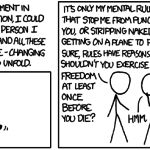We run our website the way we wished the whole internet worked: we provide high quality original content with no ads. We are funded solely by your direct support. Please consider supporting this project.
How do you respond to Romans 8:29-30?
Question: Romans 8:29–30 says that everyone God foreknew he predestined. You deny both that God foreknows and predestines individual believers. So this verse seems to refute your open view.
Answer: First, as many exegetes have noted, the sort of “knowing” Paul intends in this passage is not merely intellectual knowledge, but rather an intimate affection. Two chapters later when Paul refers to God’s people (Israel) “whom he foreknew” (Rom. 11:2), he does not mean to say that God knew about these people (as opposed to all other people) ahead of time. Paul is rather saying that God loved these people ahead of time.
Now, although God fore-loved the nation of Israel, there were still individuals within this corporate whole who clearly rejected God’s love for them (e.g. Saul, Judas), as well as individuals outside this corporate whole who chose to receive God’s love for them (e.g. Rahab, Ruth). So the fore-love spoken of in this passage is toward the class of people who keep covenant with him. Individuals can choose to either align themselves with this class of fore-loved people or not.
The same sort of thing is going on in Romans 8:29. God’s affection is set ahead of time on the class of people who will enter in covenant with God through Christ. The text does not imply that God loves certain individuals ahead of time but not others. And the text certainly doesn’t imply that God foreknows who will and will not choose to be in Christ ahead of time. In fact, any attempt to use this text to prove that God foreknows future free acts actually backfires, for the “foreknowledge” Paul speaks about is limited. Paul says “those who God foreknew he predestined…” This implies there are others God did not foreknow.
Nor can this passage be used to support that idea that God predestines who will and will not be in Christ. Read the text carefully. What is predestined is not who will be in or out, but what will happen to all who are in. They will eventually be conformed to the image of Jesus Christ and glorified. God predestines the consequence of the choice to be in Christ or not, but he doesn’t predestine the choice itself. Scripture is clear that God wants every person to put their trust in his Son, and through his Spirit God empowers us toward this end (2 Pet. 3:9).
Category: Q&A
Tags: Free Will, Q&A, Responding to Calvinism
Topics: Providence, Predestination and Free Will, Responding to Objections
Verse: Romans 8
Related Reading

What is the significance of 2 Samuel 24:12–16?
The Lord gives David three options of how Israel will be judged. “Three things I offer you; choose one of them, and I will do it to you.” This verse reveals how the Lord gives people genuine alternatives and responds to their choices. If God foreknew what David would choose, however, the purpose of the…

Boyd’s Bad Ass Tattoo
by: Greg Boyd In the process of working through a philosophical issue surrounding the openness of the future around twenty years ago, I and two friends (Alan Rhoda and Tom Belt) ended up creating the “Hexagon of Opposition”, or “Hexagonic Logic of Futurity,” as I’ve sometimes called it. I’ll explain what it all means in…

Why Compatibilistic Freedom Does Not Make Sense
Compatibilism is the view that free will is compatible with determinism. In this view, freedom is defined as the ability to do what you want, though what you want is determined by factors outside of you. Theologians who espouse this perspective, hold that God ultimately determines what individuals want. This is in contrast to “self-determining…

Isn’t it true that God doesn’t know the future in the open view?
This is the single most common misconception people have about the open view. Open Theists and Classical Theists disagree about the nature of the future, not about how much God knows about it. Both sides grant that God knows everything. He is omniscient. He knows everything there is to know about all of reality, including…

